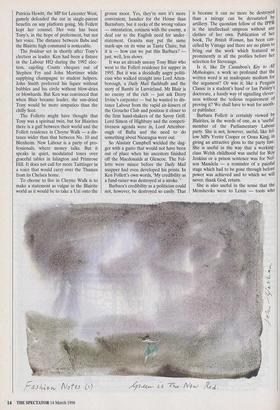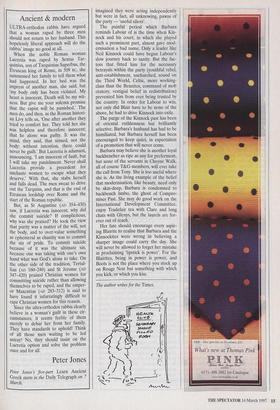PM FALLS OUT OF LUVVIE
Michael Gove on why Mr Blair keeps
his distance from once-useful Barbara
Follett — now she's an MP KEN AND BARBARA Follett are wealthy enough as a result of his writing to buy anything save for the one thing they most desire — the same intimacy with Tony that they once enjoyed with Neil. Barbara may now be an MP, but it is prov- ing much more difficult for the rich man's wife to enter her kingdom of heaven than it. is for the casual reader to get through Ins Eye of the Needle. The novels on which Mr Follett has built his fortune may lack humour and depth but at least they have an engaging style which does not grate. Which is more than can be said, according to many of her Commons colleagues, of the new member for Stevenage.
The woman who wrote 'be prime minis- ter' on her personal goal sheet at the age of 35, and then added 'join a political Party' as an afterthought, is finding that her story is unlikely to have a happy end- ing. Ms Follett may think her arrival in Parliament last May was the beginning of a wonderful new chapter in an already eventful life but she is, in the words of one Blairite, 'history'.
At one point, Ms Follett was the proto- typical Blair Babe. She helped set up Emily's List, the campaign to secure more female Labour MPs. She became a visiting fellow at the IPPR, a Blairite think-tank. She was hostess-in-chief for the luvvies who lunch and the aspiring author of a feminist-feisty, ride-the-zeitgeisty new book, The British Woman.
Now, she is almost last among equals.
Delivery for Lord Irvine. The model, according to one MP, for Brian Sedgemore's attack on the `Stepford wives' of the Labour back benches, Ms Follett is out of kilter with her more tradi- tional colleagues, out of favour with the Prime Minister's circle and, as far as some Blairites are concerned, just out to lunch.
Before her entry to the Commons Ms Follett was more than just a pretty face. She was an agreeable figure, regularly photographed on her own in the sort of suits Alexis Colby would have worn to see her divorce lawyer, or with her husband in matching leisure wear as though advertis- ing Racing Green's summer range.
The Folletts could afford, and gloried in, the glossiest outfits, so they got one to handle their personal PR. Hobsbawm Macaulay, whose senior partner, Sarah Macaulay, Gordon Brown's friend, was retained to burnish the image. Ken and Barbie assiduously made themselves avail- able for profile-writers and interviewers, whether launching one of his books or the next stage in her political career.
Barbara let it be known that she had dragged the Labour party out of its donkey jacket and into the designer warehouse, softening Harriet's hairstyle and putting Robin in autumnal colours. A phrase was conjured from somewhere, ToHefting', to describe the practice of making Labour politicians more presentable. It became as much a metaphor for Neil Kinnock's trans- formation of Labour as the adoption of the red rose, even though only Harriet Har- man, Jack Cunningham and Robin Cook are on the record as beneficiaries of Bar- bara's subtle eye.
Given the record of each in office, it might have been better for the government if they had not cut smarter figures in oppo- sition. But Barbara cannot be blamed for the follies of others. And, in her anxiety not to offend, she seems determined not to be blamed for much.
Nowadays 'too busy' to be interviewed, Barbara has avoided sticking her elegantly bobbed head above the parapet since her election. While another Kinnock intimate, Patricia Hewitt, the MP for Leicester West, gamely defended the cut in single-parent benefits on any platform going, Ms Follett kept her counsel. Her vote has been Tony's, in the hope of preferment, but not her voice. The distance between Babs and the Blairite high command is noticeable.
The froideur set in shortly after Tony's election as leader. Ken had been a fixture in the Labour HQ during the 1992 elec- tion, cajoling Coutts cheques out of Stephen Fry and John Mortimer while supplying champagne to student helpers. John Smith preferred his liquor without bubbles and his circle without blow-dries or blowhards. But Ken was convinced that when Blair became leader, the sun-dried Tony would be more simpatico than the chilly Scot.
The Folletts might have thought that Tony was a spiritual twin, but for Blairites there is a gulf between their world and the Follett residence in Cheyne Walk — a dis- tance wider than that between No. 10 and Blenheim. New Labour is a party of pro- fessionals, where money talks. But it speaks in quiet, modulated tones over graceful tables in Islington and Primrose Hill. It does not call for more Taittinger in a voice that would carry over the Thames from its Chelsea home.
To choose to live in Cheyne Walk is to make a statement as vulgar in the Blairite world as it would be to take a Uzi onto the grouse moor. Yes, they're sure it's more convenient, handier for the House than Barnsbury, but it reeks of the wrong values — ostentation, cosiness with the enemy, a deaf ear to the English need for under- statement. Granita may put the same mark-ups on its wine as Tante Claire, but it is — how can we put this Barbara? just, well, less showy.
It was an already uneasy Tony Blair who went to the Follett residence for supper in 1995. But it was a decidedly angry politi- cian who walked straight into Lord Atten- borough, a Daily Mail flashbulb and the story of Bambi in Luvvieland. Mr Blair is no enemy of the rich — just ask Deny Irvine's carpenter — but he wanted to dis- tance Labour from the vapid air-kissers of the Groucho Club and position it closer to the firm hand-shakers of the Savoy Grill. Lord Simon of Highbury and the competi- tiveness agenda were in, Lord Attenbor- ough of Bafta and the need to do something about Nicaragua were out.
So Alastair Campbell wielded the dag- ger with a gusto that would not have been out of place when his ancestors finished off the Macdonalds at Glencoe. The Fol- letts were mince before the Daily Mail snapper had even developed his prints. In Ken Follett's own words, 'My credibility as a fund-raiser was destroyed at a stroke. '
Barbara's credibility as a politician could not, however, be destroyed so easily. That is because it can no more be destroyed than a mirage can be devastated by artillery. The quondam fellow of the IPPR is the intellectual empress without any clothes of her own. Publication of her book, The British Woman, has been can- celled by Vintage and there are no plans to bring out the work which featured so prominently in all the profiles before her selection for Stevenage. Is it, like Dr Casaubon's Key to All Mythologies, a work so profound that the written word is an inadequate medium for the argument? Or was it, like a Penguin Classic in a student's hand or Ian Paisley's doctorate, a handy way of signalling clever- ness without the tedious requirement of proving it? We shall have to wait for anoth- er publisher.
Barbara Follett is certainly viewed by Blairites, in the words of one, as a 'useful' member of the Parliamentary Labour party. She is not, however, useful, like fel- low MPs Yvette Cooper or Oona King, in giving an attractive gloss to the party line. She is useful in the way that a working- class Welsh childhood was useful for Roy Jenkins or a prison sentence was for Nel- son Mandela — a reminder of a painful stage which had to be gone through before power was achieved and to which we will never, thank God, return.
She is also useful in the sense that the Mensheviks were to Lenin — tools who imagined they were acting independently but were in fact, all unknowing, pawns of the party — 'useful idiots'.
The painful period which Barbara reminds Labour of is the time when Kin- nock and his court, in which she played such a prominent part, almost gave mod- ernisation a bad name. Only a leader like Neil Kinnock could have begun Labour's slow journey back to sanity. But the fac- tors that fitted him for the necessary betrayals within the party (youthful rebel, anti-establishment, unchurched, sound on the Third World, Celtic, more working- class than the Bennites, command of mob oratory, vestigial belief in redistribution) prevented him from ever being trusted by the country. In order for Labour to win, not only did Blair have to be none of the above, he had to drive Kinnock into exile.
The purge of the Kinnock past has been of oriental ruthlessness but brilliantly selective. Barbara's husband has had to be humiliated, but Barbara herself has been encouraged to keep quiet, in expectation of a promotion that will never come.
Barbara may believe she is another loyal backbencher as ripe as any for preferment, but none of the servants in Cheyne Walk, all of course T&G members, will ever take the call from Tony. She is too useful where she is. As the living example of the belief that modernisation, like beauty, need only be skin-deep, Barbara is condemned to backbench limbo, the ghost of Compro- mises Past. She may do good work on the International Development Committee, enjoy Tradefair tea with Clare and long chats with Glenys, but the laurels are for- ever out of reach.
Her fate should encourage every aspir- ing Blairite to realise that Barbara and the Kinnockites were wrong in believing a sharper image could carry the day. She will never be allowed to forget her mistake in proclaiming 'lipstick is power'. For the Blairites, being in power is power, and Boots is not the place where you stock up on Rouge Noir but something with which you kick, or which you kiss.
The author writes for the Times.




































































 Previous page
Previous page